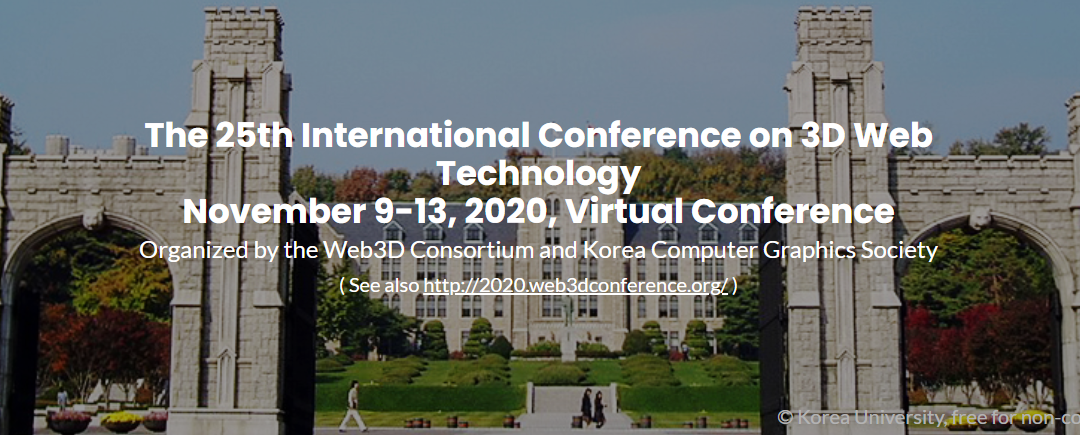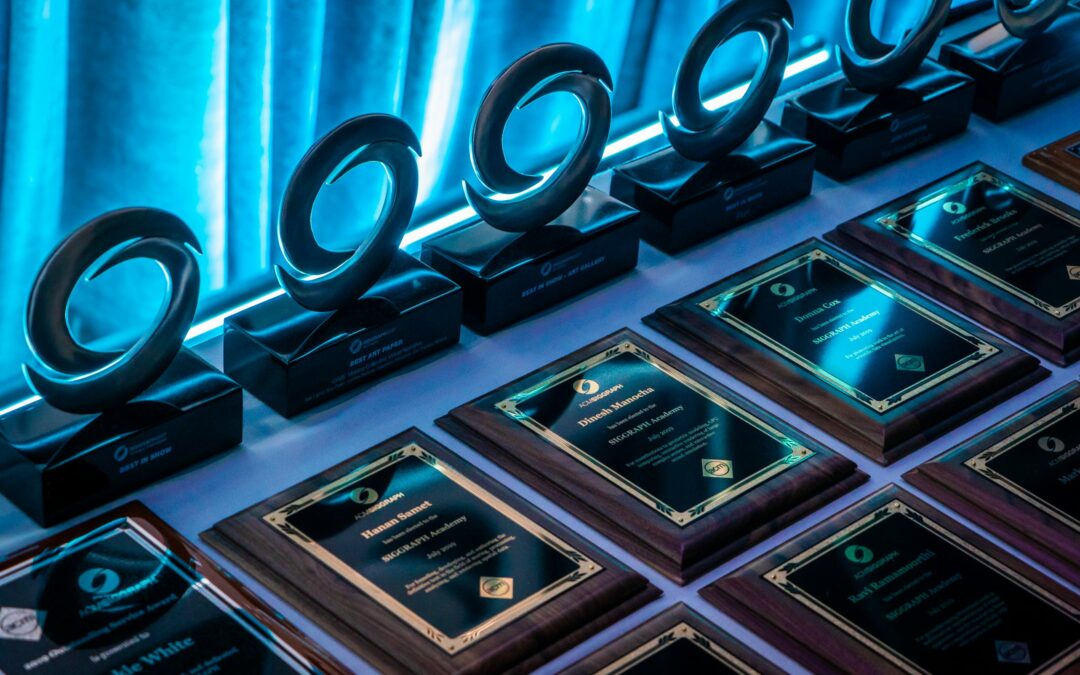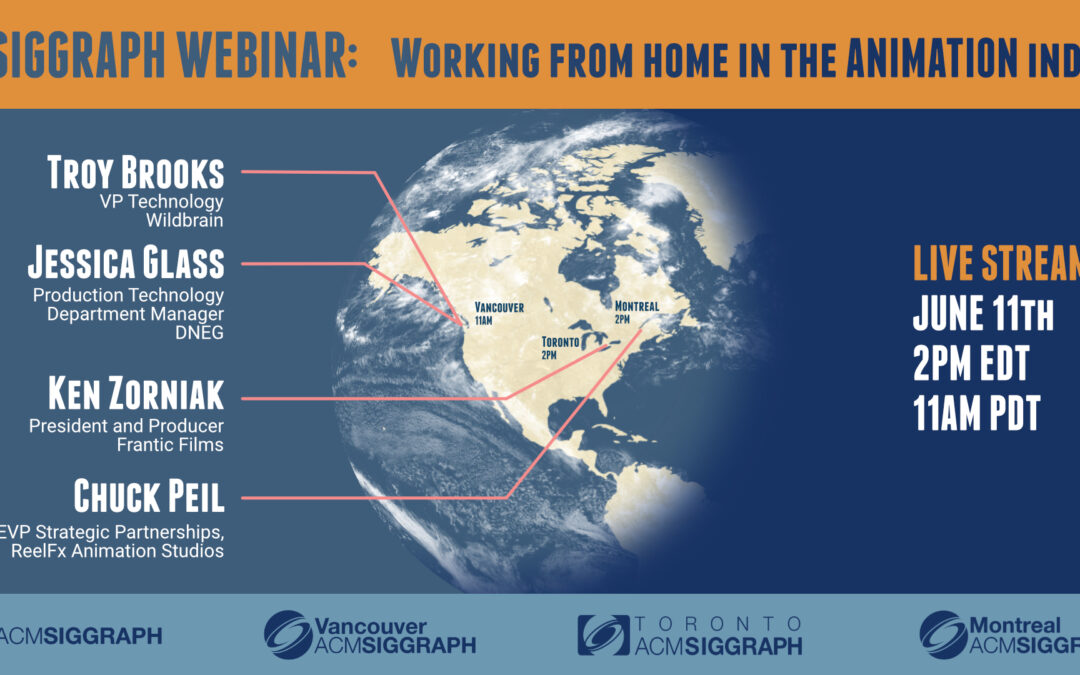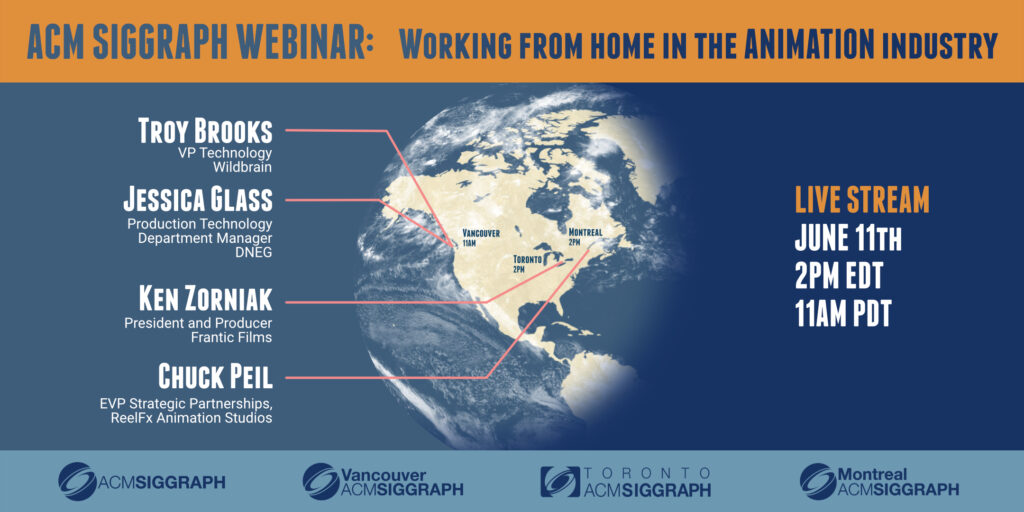
The 25th International ACM Conference on Web3D Technology
November 9-13, 2020, Virtual Conference, Seoul, Korea
Supported by ACM SIGGRAPH: In Cooperation with The Web3D Consortium and Korea Computer Graphics Society
- Paper and poster submission: August 3, 2020
- Demonstration submission: September 26, 2020
- Industrial use cases submission: September 19, 2020
- Tutorial&Workshop submission: September 12, 2020
- Standards session submission: September 19, 2020
- Paper and poster acceptance: September 7, 2020
- Tutorial/workshop/demonstration/industrial use case
- acceptance: October 12, 2020
- Camera-ready paper/poster/demo: September 21, 2020
- HAnim competition subission: October 12, 2020
The 25th International ACM Conference on Web3D Technology (Web3D 2020), organized by ACM SIGGRAPH in cooperation with Web3D Consortium and Korea Computer Graphics Society, will address an extensive range of research, development, and practices related to Web-based interactive 3D applications. Web3D 2020 will be held as a virtual conference in Korea University, Seoul, Korea on November 9-13, 2020.
The goal of the conference is to share innovative and creative ideas that enable development of 3D applications for a wide range of 3D environments, including the web, mobile as well as virtual and augmented reality (XR) setups. Works related to various application domains, including education, healthcare, e-commerce, informatics, cultural heritage/tourism, entertainment, mass media, military, and construction (and many others) are welcome. This year’s theme “3D for Hyperconnected World , which emphasizes the increasingly global scope and wide impact of current and future high quality 3D content over high speed network. The Web3D community seeks to foster and support the increasing development, use, and utility of 3D content over high speed network by application developers, domain experts, as well as for end users. This includes the creation of interactive 3D content, robust and versatile 3D content representation and delivery standards, as well as presentation and interaction techniques enabling the development of user-friendly 3D applications on the Web.
Use the following list of the topic areas as a reference rather than a limitation. We welcome all topics related to Web/mobile 3D content creation, 3D printing, publishing technology, tools, and related studies.
For Web3D application developers
- Novel technologies, tools, middleware
- VR/AR/MR/XR
- 3D content creation and modelling, 3D content scanning/re
construction/printing - Novel APIs, toolkits, and frameworks for Web3D and
associated application domains - AI on Web 3D
- Human modeling on Web3D
- Cloud-based rendering and services for large-scale models,
animations, and virtual worlds - Streaming, compression, and transmission of 3D content
- Virtual humans, avatars, and complex reactive characters
- Motion capture for composition and streaming of behaviors
and expressions - HTML5 3D, WebGL, glTF, and other languages that support the
3D Web
For Domain experts
- Algorithms for shape modeling, compression, optimization,
analysis, and processing - Novel APIs, toolkits, and frameworks for Web3D and associated
- application domains
- Semantic Web for 3D objects and scenes
- X3D application examples
For Web3D users
- Multi-modal 3D interaction paradigms including spatial UI,
- gesture and voice
- Visual analytics based on Web3D technologies
- Diffusion and adoption of Web3D technologies, comparative
- studies, historical perspectives, WWW integration
- Novel interactive 3D web applications in all areas and sectors
- such as entertainment, education, training, cultural heritage,
- digital twin, medicine, military, smart-manufacturing / industry
- 4.0, information & data visualization, science, geographic
- information systems (GIS), digital globes, subsurface exploration
- and mining, integrated marine data management and visualization, building information modeling(BIM), and architecture.ilding
- information modeling (BIM), and architecture
- Web3D/Mobile 3D applications and usability studies, navigation
- performance, immersion impact
Submission Link : http://easychair.org/conferences/?conf=web3d2020
Submission Guidelines
Full or Short Papers presenting original work in Web3D research and applications may be submitted in long or short form (up to 9 or 4 pages, EXCLUSIVE of the page(s) devoted to bibliographic references and short appendices). Do include a full citation list. Submissions will be peer-reviewed. Accepted papers will be included in the ACM Digital Library and submitted to major indexing services, such as Web of Science, DBLP, and Scopus. (Instructions for Authors: https://www.siggraph.org/learn/instructions-authors/)
Posters present results of ongoing or recently completed work in 3D web research and application. The poster format offers the opportunity to interactively present and discuss interesting results to the Web3D community. Posters should be submitted in the form of abstracts (2 pages). Posters must be formatted using the document templates for conferences supported by ACM SIGGRAPH. Upon acceptance, the final revised poster is required in paper and electronic format.
Tutorials are an opportunity to present introductory and advanced applications of Web3D technologies to students and to experienced practitioners. Tutorial subjects can include practices for authoring interactive 3D scenes and using 3D graphics in diverse application areas. Especially welcome are tutorials in the use of open-source software and Web applications which can be presented in hands-on sessions at the conference.
Workshops provide a forum for researchers and practitioners from both the Web and 3D multimedia communities to discuss and exchange positions on current and emergent Web3D topics. Workshops may take the form of presentation sessions moderated by workshop organizers or open discussions of new knowledge on a specific topic of interest. Each session will last 90 minutes with presentations and discussions.
Demonstrations enable artists, content designers, and developers to share their innovative 3D work at the conference. Artwork and applications developed for various platforms, including the Web, desktop, mobile, and VR/AR systems, are welcome.
Industrial use case enable practitioners to demonstrate how Web3D technologies may be used in industrial applications. A special track during Web3D 2020 will be devoted to industrial use cases to share best practices, and requirements of using 3D in various application domains. Each presentation will last 20 minutes with 5-10 minutes for discussions.
Standard Sessions provide a meeting for researchers and practitioners from both the Web and 3D multimedia communities to discuss and exchange standardization issues on current and emergent Web3D topics.
Competition(HAnim) is an annual competition dedicated to showing how HAnim and X3D graphics standards can be used for creating animated music videos. The competition is organized by the Korean Standards Association (KSA) and Web3D Consortium. For competitors, attendance at the conference is no tmandatory but is encouraged. (https://www.web3d.org/2020-hanim-3d-animated-music-video-competition)
※ The accepted papers and poster summaries will be published in the Web3D 2020 Conference Proceedings, available in the ACM Digital Library, Journal of Computational Design and engineering (JCDE) and Computer Animation and Virtual Worlds(CAVW). All papers must be original and not simultaneously submitted to another journal or conference.
※ Registration to the Web3D 2020 conference is free for everyone including authors
※ Questions about the CFP, program and conference should be emailed to program2020@web3dconference.org
Submission Link : http://easychair.org/conferences/?conf=web3d202







